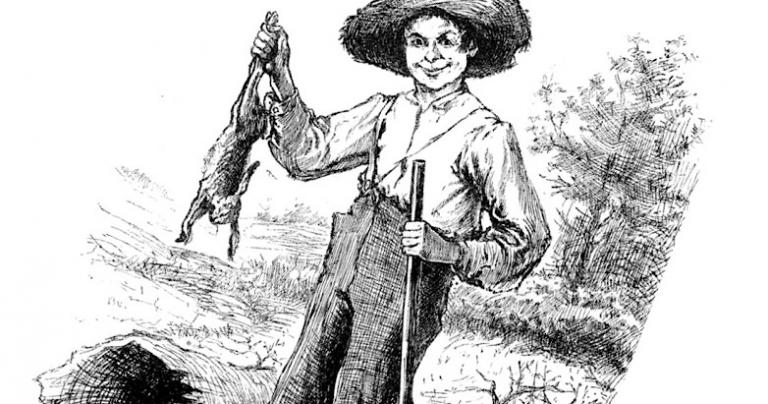 The best professors make you see in a new way, consider again old opinions you thought settled. Mark Twain blasts his ideas about reality in such an obvious way, while posturing as transgresssive, and yet was treated reverently by his contemporaries. He hated Victorian values so much he got rich making fun of them and other than his remarkable Joan of Arc, his work and especially his humor is often as predictable as Internet atheist memes.
The best professors make you see in a new way, consider again old opinions you thought settled. Mark Twain blasts his ideas about reality in such an obvious way, while posturing as transgresssive, and yet was treated reverently by his contemporaries. He hated Victorian values so much he got rich making fun of them and other than his remarkable Joan of Arc, his work and especially his humor is often as predictable as Internet atheist memes.
And yet Leo Tolstoy also postured as a social critic while getting prizes and his books are marvels regardless. Am I being too hard on the old hypocrite?
Karen Swallow Prior has written a marvelous book on reading well and she got me thinking about Twain in a new way like a good professor would. I pulled out my Twain and realized: he is better than I recollect. Thank you Professor KSP.
More important than getting me to overcome my aversion to the man and his memoirs, KSP taught me about courage through The Adventures of Huckleberry Finn . . . A book I would otherwise be tempted to think the most overrated in American history.
Courage: Not Rashness or Boldness
KSP has written a chapter on courage that is just so. This makes it hard to interact. Should I simply say: “Amen” and then attend to wisdom?
Perhaps.
But I am an academic by training, so I will think about this little jewel of a chapter, as complete a picture of the virtue of courage as one is going to get in a few hundred words.
KSP defines courage in opposition to bravery, brashness and boldness as:
Courage is measured not by the risk it entails but by the good it preserves.
Put more expansively:
The person who is virtuously courageous displays not merely a single act of courage but the habit of courage. Courage—or fortitude, as it is often called—is defined most succinctly by moral philosophers and theologians as the habit that enables a person to face difficulties well.
This is just so. Anyone who thinks to call Adolph Hitler courageous is a person to be avoided. The Iron Cross he won in World War I is real, but he was in the service of a bad cause and a bad man. He was brave, but in the service of the Kaiser against civilization. He was a bad man, bold, in the service of a bad cause.
There is nothing to commend here and KSP shows us why. The virtue of courage cannot be found in the service of a bad cause. All the virtues interlock and left apart from justice, practical wisdom, or moderation, courage is a Lego left out on the floor that is stepped on in the middle of the night.
There is nothing good there. Courage is in the service of justice. Justice never serves courage.
In Which I Note Something I Wish I did not have to Note.
KSP rightly says that classically courage historically is:
The word courage comes from the same root word that means “heart.” To be encouraged is to be heartened or made stronger. When we exhort a person to “take heart,” we mean for her to stand strong and be of good courage.
Just so.
Yet I must point out what KSP knows . . . The Greeks would have thought that this virtue was manliness and only available (except in rare cases) to biological males. The man with courage was a man with a chest: a male chest. The term is not just heart, but also maleness.
This is quite evil, but the idea infects us still.
KSP generously is silent about this abuse of language, but fools rush in and so I will simply state: our ideas of courage are too limited as a result. Courage like any human virtue is for all of us.
That is so obvious, I apologize for stating it, particularly as a man of no particular courage. The man who cannot see the courage in a woman has abolished humanity. That person will never be surprised by joy, instead looking only to a few stereotypical versions of courage. KSP avoids this error.
We need many voices from many nations to do our best to emulate Paradise. How could we ever tolerate, let alone encourage, the error that half of humanity can be ignored or be without any virtue?
God have mercy on me a sinner.
I have much to learn.
A Tension Between Courage and Justice
KSP says:
Huckleberry Finn is a boy who is all heart. And Huckleberry Finn is the story of that boy getting his heart in the right place as he learns to rightly order his desires.
Twain masterfully (if KSP is correct) shows that courage comes unexpectedly:
In depicting this attainment of virtue through a combination of consequence and coincidence, Huckleberry Finn reflects the way life falls out for most of us most of the time: some choices we face are the result of our own doings, others completely outside of our control, most some combination of the two. How much nicer it would be not to face difficulties at all. Given the impossibility of that, the next best thing is to face hard circumstances with the virtue of courage.
There is a tension here. When discussing justice KSP has rightly shown us that we need to be just to self, but courage often features self-sacrifice. How does this balance out?
KSP shows us, though it was hard for me to see. Self-sacrifice is the choice that justice gives us when a broken world cannot be fixed in any other way. We need not give our life: no person is forced to self-sacrifice. We can. If we are courageous, we will. We might even act courageously to save our own life!
All our choices depends on justice. Huck struggles with this, because as KSP points out, his twisted slave-based culture teaches him injustice as justice. He has natural bravery, unlike Tom Sawyer he is not merely tricksy, but his bravery is muted. Why? Society has taught him to use his bravery in service to evil: slavery. Bravery tied to evil is merely brash. Huck may become courageous, but I am still unsure.
Huck never knows that he is serving justice. He thinks in helping his friend Jim, the only obviously courageous person in the book, that he is serving evil. Does Huck ever know he is serving justice? Can you do “evil” that is really good and still be courageous?
I am unsure. After all:
Because courage is always connected to justice, and because justice is judged by reason, philosophers refer to courage as “a work of reason.”
Jim the Hero
Mark Twain wrote one character who is surely brave: the enslaved man Jim.
He is never passive, he is patient. Jim is brave in the service of virtue, never rash in selfishness. He is not on an adventure, he is looking to save his family.
KSP is right: to the extent Twain can understand an enslaved man, Jim is the best person in the story. He is in a culture whose vice is to break him and he will not be broken. He is a man and a man endures as a man:
Jim exhibits the virtue of courage throughout, but the fortitude he shows at the end of the story illustrates particularly well one of the essential qualities of courage: endurance.
Jim is good or as good as he can be in his situation.
The Theosis of Huck Finn
KSP shows that Huck has gone on a hero’s journey, a Christian trip becoming more like God. This is Theosis, being like Christ who (as Athanasius puts it) became a man so we could become God. Of course, this is not God in His essence, but God in His energies.
By the end of the novel, Huck stands transfigured:
Huck’s transformation from ne’er-do-well into a boy whose developing fortitude drives him to stand against a great wrong supported by his society has made Huck Finn one of the most paradigmatic characters in all of American literature.
KSP has changed my view of this book. I see that Samuel Clemons, the soul created in the image of God, came through the Mark Twain posturing, and gave us a book about courage.
Buy the book.
————————————-
This will be a twelve part series: Introduction, Prudence, Temperance, Justice, Courage,
















